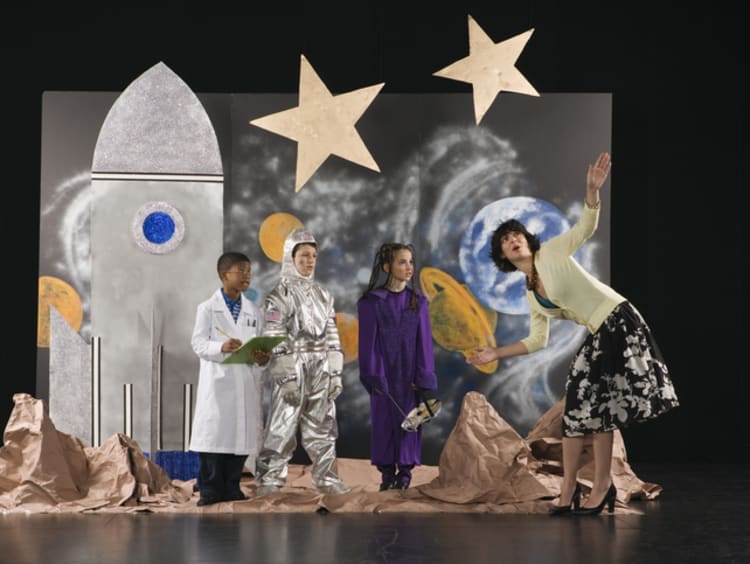How To Become a Theatre Teacher

The teaching profession attracts academics who love to learn and are passionate about sharing their knowledge with others. Yet, there is also room for creative self-expression in this field. Those who are passionate about theatre productions, performing arts and teaching might consider combining their interests by teaching drama.
As a drama teacher, you are responsible for delivering theatre education to students and helping them experience the joy of creative self-expression. You also choose appropriate theatrical productions for your students to perform and guide their performances. Learn how to become a theatre teacher and prepare to pursue a career inspiring the next generation.
In This Article:
- Is Becoming a Drama Teacher Right for You?
- What Does a Drama Teacher Do?
- An Overview of Becoming a Theatre Teacher
- Becoming a Theatre Major
- Before Pursuing Drama Teacher Jobs, Complete a Student Teaching Experience
- How To Be a Drama Teacher with State Licensure or Certification
- Additional Requirements for Aspiring Postsecondary Drama Teachers
- Are There Jobs Available For Teachers
Is Becoming a Drama Teacher Right for You?
Before learning about how to be a drama teacher, it’s worth taking a closer look at whether teaching drama might be the right choice for you. Teachers can play a significant role in guiding students’ personal growth and development, as well as their academic achievements. They can help encourage their students' success and guide the next generation of young leaders.
If you share these goals and have decided that you want to become a teacher, the next step is to consider why you want to teach theatre in particular. The following reasons might ring true for you:
- Drama classes can allow students to have fun while learning.
- Theatre productions help teach students self-confidence and practical problem-solving.
- Students are taught the value of collaboration and cooperation.
- Drama classes can help empower students to creatively express themselves within a safe, supportive environment.
- Theatre and drama use creative storytelling to teach us useful lessons about real-life.
You might have other reasons to pursue a career in theatre education in addition to those listed above. The key is that you pursue your career aspirations with intent and purpose.
What Does a Drama Teacher Do?
Drama teachers are often employed by public and private schools, as well as colleges and universities. Some of them may seek additional opportunities as private tutors.
A drama teacher has a unique hybrid role. They are responsible for both classroom instruction and theatrical productions at the school. Much of the school day will be spent in the classroom teaching acting, stage management, directing, the history of theatre, design, technology and related subjects. The rest of the day will be spent working with students to put on a theatrical production, which may be a play or a musical.
Drama teachers perform many of the same tasks that core subject area teachers do, including:
- Designing lesson plans
- Delivering lessons
- Assigning and grading homework and assignments
- Talking to parents during parent-teacher conferences
However, they must also take on the following responsibilities:
- Choosing an appropriate play or musical each school year or each semester
- Casting students in the roles
- Helping students understand the play or musical, and guiding them in acting their roles
- Managing the many backstage elements of a theatrical production, including lighting, costumes and set props, sound and stage management and production
- Delegating theatre management responsibilities to students
- Holding rehearsals and producing the play or musical for the student body and community to enjoy
An Overview of Becoming a Theatre Teacher
The process of becoming a drama teacher can begin in high school. Talk to your guidance counselor about adding theatre-related classes to your course load. Furthermore, hands-on experience is critical for future educators. As such, it’s important to get involved with your high school’s drama club.
Try to land roles in as many theatre productions as possible during your time in high school. In addition to acting on the stage, you can gain practical experience by supporting theatre productions in other capacities. For example, you might work on the set design, costume design, lighting or backstage as crew. Remember, theatre production is an entire area of study, not a “side” part of the art form.
Throughout your time in high school, take notes about your extracurricular activities and what you learned from them. This can aid you when it’s time to create your college applications and admission essays.
When it’s time to apply to college, look for a school with a strong theatre department. To become a drama teacher, in addition to majoring in drama, you may need to obtain your teaching license. A program like the bachelor’s degree in theatre education that leads to initial teacher licensure might be a good choice. Before submitting applications, consider where you would like to teach after college.
Different states have varying licensing requirements for teachers. All states require public school teachers to hold a license or certification. However, they may have different eligibility criteria for those credentials. It’s important to ensure that the program you choose will enable you to meet the licensing criteria for the state in which you plan to teach.
After earning a theatre education degree and your required teaching credentials, you may consider pursuing a career as a secondary drama teacher. Another thing to consider is whether you might want to teach at the university level. If so, you may need to earn a graduate degree and possibly gain experience working in the theatre industry.
Becoming a Theatre Major
The specific curriculum will vary from one school to the next. However, as a theatre major, you can expect to receive both classroom instruction and practical, hands-on experience working on theatrical productions.
Some schools build theatre participation directly into the curriculum to encourage their students to get involved. You should try to participate in most or all of the following areas:
- Technical theatre production
- Front of house management, ticketing, ushering
- Theatre performance or acting
- Stage and production management
It’s always a good idea to actively solicit feedback from your instructors and other, more advanced students. Take notes, keep an open mind and learn from your mistakes so you’ll be better positioned to help your students in the future.
In addition to your work on the stage and behind the scenes at your school’s theatrical productions, you’ll study your craft in the classroom. Some of the topics commonly covered in a theatre education program often include:
- The fundamentals of theatre design, including scene, lighting, costume and makeup design
- Instructional methods, course materials, lesson planning and student assessment
- The history of theatre from ancient to modern times, including major developments in theatrical trends
- The creation and management of a positive and productive classroom with diverse students
Before Pursuing Drama Teacher Jobs, Complete a Student Teaching Experience
The final step before graduating from your theatre major program is student teaching. Note that your state will likely have additional requirements before you will be eligible to become a student teacher.
It’s not uncommon for student teachers to split that time between two different grades and schools. This allows you to apply what you’ve learned in different settings and to gain experience with multiple grade levels.
As a student teacher, you will work under the supervision of your college, the school you are placed with, and the experienced teacher whose classroom you are visiting. When you first arrive in the classroom, you will likely be asked to observe for a day or two. Then, you may begin working with the students one-on-one and in groups.
Throughout your student teaching experience, you may be asked to perform the following job duties:
- Create lesson plans
- Present lessons to the class
- Troubleshoot classroom problems
- Attend faculty meetings and parent-teacher conferences
- Contribute to the school’s current theatrical production
A student teaching experience is an opportunity to apply what you’ve learned in college to classroom settings and improve your lesson planning and instructional methods.
How To Be a Drama Teacher with State Licensure or Certification
After you have completed your student teaching experience and earned your bachelor’s degree in theatre education, you’ll need to apply for licensure or certification from the state in which you plan to teach. Each state has different eligibility requirements, so check with your state’s Department of Education to begin the application process. Be sure to read the application information carefully, as submitting an incomplete application package will be grounds for rejection.
Additional Requirements for Aspiring Postsecondary Drama Teachers
If you intend to provide theatre education to secondary students, then earning a bachelor’s degree and state licensure is sufficient to begin searching for your first job. However, some aspiring teachers go through the process of becoming credentialed and completing a student teaching experience only to discover that they would prefer to work with older students. These drama professionals may prefer to teach theatre at the college level.
To become a college professor of theatre, you may need to complete at least a master’s degree in this field. If you would like to teach at a four-year university, you may also plan to earn a doctoral degree or a Master of Fine Arts degree (MFA).
Are There Jobs Available For Teachers?
There is a need for teachers of all kinds. The U.S. Bureau of Labor Statistics Occupational Outlook Handbook estimates job growth for high school teachers to increase by about 5% from 2021 to 2031. This indicates that employers expect to hire about 77,900 new high school teachers each year through 2031.1 It’s important to note, however, that these statistics apply to all types of high school teachers; separate statistics for theatre teachers specifically are not available.
In addition to the opportunities for secondary teachers, the U.S. Bureau of Labor Statistics Occupational Outlook Handbook estimates job growth for postsecondary teachers to increase by about 12% from 2021 to 2031, much faster than average. This indicates an estimated increase of 132,600 new openings each year for all types of postsecondary teachers (not limited to theatre teachers).2
You can combine your passion for theatre with purpose at Grand Canyon University. The College of Arts and Media is pleased to offer the Bachelor of Arts in Theatre for Secondary Education degree program, which is aligned with the standards of the Interstate New Teacher Assessment and Support Consortium (INTASC) and the National Association of Schools of Theatre (NAST). This degree includes student teaching experience and leads to initial teacher licensure, enabling our graduates to pursue drama teacher jobs with confidence.
Complete the form on this page to begin envisioning your future at GCU. We are a learning community that adheres to Christian principles.
1 COVID-19 has adversely affected the global economy and data from 2020 may be atypical compared to prior years. The pandemic may impact the predicted future workforce outcomes indicated by the U.S. Bureau of Labor Statistics as well. Accordingly, data shown is based on April 2023, which can be found here: U.S. Bureau of Labor Statistics, Occupational Outlook Handbook, High School Teachers, retrieved April 27 2023.
2 COVID-19 has adversely affected the global economy and data from 2020 may be atypical compared to prior years. The pandemic may impact the predicted future workforce outcomes indicated by the U.S. Bureau of Labor Statistics as well. Accordingly, data shown is based on April 2023, which can be found here: U.S. Bureau of Labor Statistics, Occupational Outlook Handbook, Postsecondary Teachers, retrieved April 2023.
Approved by the assistant vice president of GCU marketing on June 8, 2023.
The views and opinions expressed in this article are those of the author’s and do not necessarily reflect the official policy or position of Grand Canyon University. Any sources cited were accurate as of the publish date.


